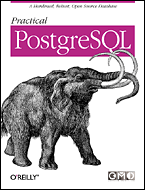
|
FreeComputerBooks.com
Links to Free Computer, Mathematics, Technical Books all over the World
|
|
- Title Practical PostgreSQL
- Author(s) John C. Worsley, Joshua D. Drake
- Publisher: O'Reilly Media (January 2002); eBook (Command Prompt, Inc., 2001)
- License(s): Open Publication License
- Paperback 636 pages
- eBook HTML
- Language: English
- ASIN: N/A
- ISBN-10: 1565928466
- ISBN-13: 978-1565928466
- Share This:

|
Arguably the most capable of all the open source databases, PostgreSQL is an object-relational database management system first developed in 1977 by the University of California at Berkeley. In spite of its long history, this robust database suffers from a lack of easy-to-use documentation. Practical PostgreSQL fills that void with a fast-paced guide to installation, configuration, and usage.
This comprehensive new volume shows you how to compile PostgreSQL from source, create a database, and configure PostgreSQL to accept client-server connections. It also covers the many advanced features, such as transactions, versioning, replication, and referential integrity that enable developers and DBAs to use PostgreSQL for serious business applications. The thorough introduction to PostgreSQL's PL/pgSQL programming language explains how you can use this very useful but under-documented feature to develop stored procedures and triggers. The book includes a complete command reference, and database administrators will appreciate the chapters on user management, database maintenance, and backup & recovery. With Practical PostgreSQL, you will discover quickly why this open source database is such a great open source alternative to proprietary products from Oracle, IBM, and Microsoft.
About the Authors- N/A
 Similar Books:
Similar Books:
-
 Postgres: The First Experience (Egor Rogov, et al.)
Postgres: The First Experience (Egor Rogov, et al.)
This short pamphlet provides an overview of PostgreSQL DBMS, covering the history of its development, the main features, and a product roadmap. If you are just getting started, you can use this book as a step-by-step installation and configuration guide.
-
 Postgres Succinctly (Peter Shaw)
Postgres Succinctly (Peter Shaw)
This book provides a concise overview to help you quickly understand and use PostgreSQL's unique features. It guides you from installing Postgres, to creating your first database, to using Postgres in a .NET application with ADO .NET and Entity Framework.
-
 PostgreSQL: An Introduction (WikiBooks)
PostgreSQL: An Introduction (WikiBooks)
The purpose of this book is an introduction to the PostgreSQL specific aspects: its architecture, installing procedure, maintenance and optimization tasks. Thus it is primarily aimed to database administrators.
-
 PostgreSQL Internals (Egor Rogov)
PostgreSQL Internals (Egor Rogov)
Briefly touching concepts of PostgreSQL, plunges into the depths of data consistency and isolation, explaining implementation details of multiversion concurrency control and snapshot isolation, buffer cache and write-ahead log, and the locking system.
-
 The Internals of PostgreSQL (Hironobu Suzuki)
The Internals of PostgreSQL (Hironobu Suzuki)
This book describes the internals of PostgreSQL for database administrators and system developers. The main purposes of this book are to explain how each subsystem works, and to provide the whole picture of PostgreSQL.
-
 PostgreSQL: Introduction and Concepts (Bruce Momjian)
PostgreSQL: Introduction and Concepts (Bruce Momjian)
The book is designed to lead the reader from their first database query through the complex queries needed to solve real-world problems. No knowledge of database theory or practice is required.
-
 PostgreSQL Notes for Professionals (Goalkicker)
PostgreSQL Notes for Professionals (Goalkicker)
This book is the definitive guide to undocumented and partially-documented features of the PostgreSQL server. It helps you learn to apply the right solution at the right time, about avoiding risk, about making robust choices related to PostgreSQL databases.
-
 PostgreSQL Tutorials
PostgreSQL Tutorials
These tutorials offer readers a thorough overview of database basics, starting with an explanation of why you might need to use a PostgreSQL database, and following with a summary of what different database types have to offer when compared to alternatives like spreadsheets.





